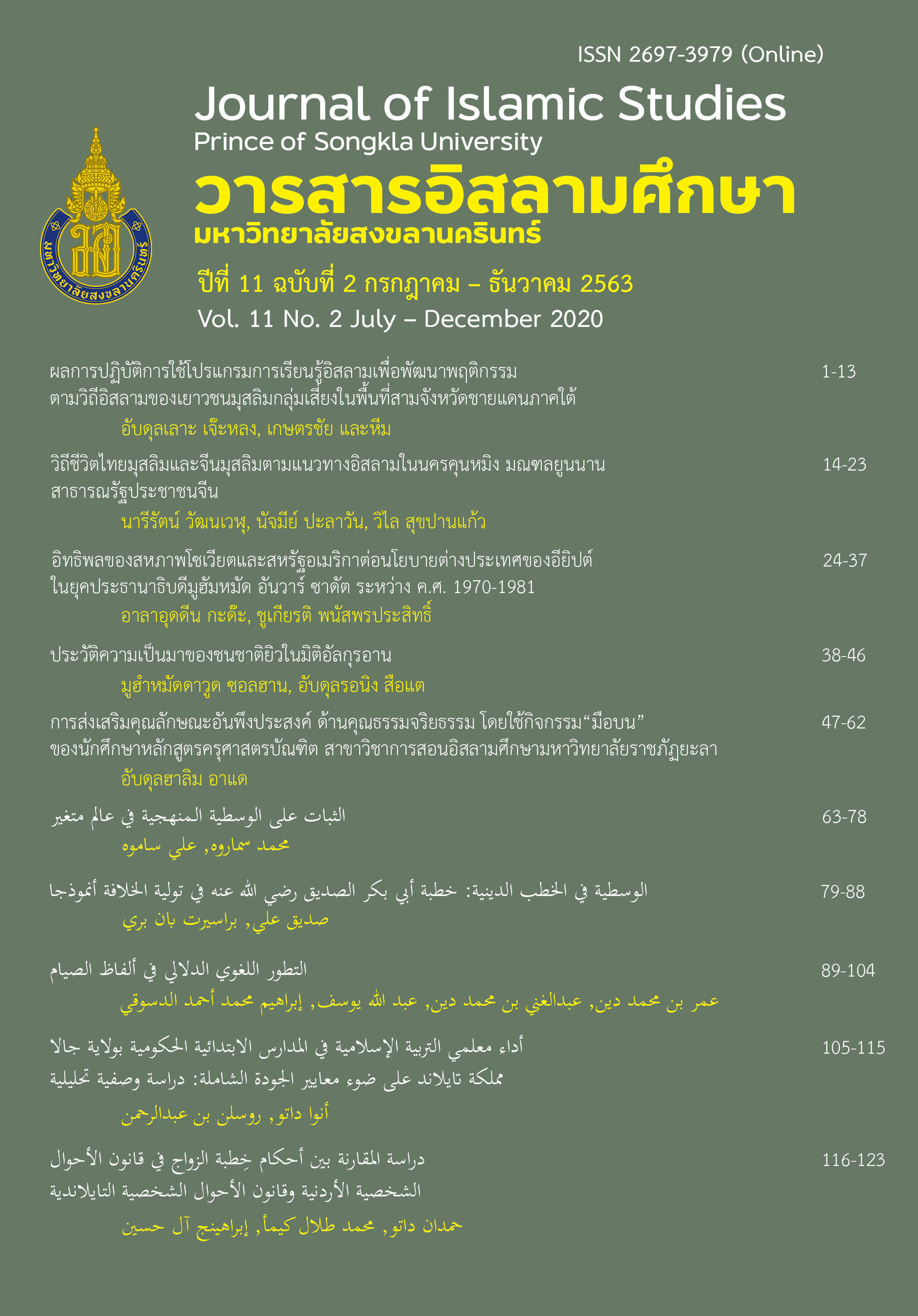The Influences of the Soviet Union and the United States to Egypt’s Foreign Policy in the President Muhamad Anwar Sadat’s Period during 1970-1981
Keywords:
President Sadat, Egypt’s Foreign Policy, the Arab World, the Soviet Union, the United StatesAbstract
This article aims to study about factors affecting the change of Egypt’s foreign policy towards The Arab World in the President Mohammad Anwar Sadat’s period during 1970-1981. Egypt under President Sadat changed the direction of Egypt’s foreign policy to the Arab World by supporting the west and reducing Egypt’s role of being leader in Arab countries in Middle East region as well as implementing policy to build relationships with some Arab countries that giving benefits to Egypt only. President Sadat highlighted importance to Egyptian Nationalism and Egypt first policy that causing Egypt in the President Sadat’s period to be considered as ineffective leader in Arab countries which made resentment to Arab people and other Arab countries in the Middle East region. Especially, created disharmony and conflict between Arab countries after Egypt’s signing in the Egypt-Israel Peace Treaty with Israel in 1979 that finally affecting Egypt to be expelled from the Arab League which is the oldest regional organization in the Middle East. The results of the study shown that factors affecting the change of Egypt’s foreign policy towards the Arab World in the President Sadat’s period were policy implementation of external powers which were the Soviet Union and the United States to Egypt.
References
จรัญ มะลูลีม. (2557). Arab Spring: การลุกฮือที่เปลี่ยนโฉมหน้าของโลกอาหรับ. กรุงเทพฯ: สยามปริทัศน์.
Burns, W. J. (1985). Economic Aid and the American Policy toward Egypt, 1955-1981. New York, Albany: State University of New York Press.
Dakhlallah, F. (2012). The League of Arab States and Regional Security: Towards an Arab Security Community?, British Journal of Middle Eastern Studies, 39(3): 393-412.
Dawisha, A. I. (1976). Egypt in the Arab World: the Elements of Foreign Policy. London: Macmillan; New York: distributed by Halsted Press.
Darwisheh, H. (2015). Regime Survival Strategies and The Conduct of Foreign Policy in Egypt. Middle East Review of IDE-Jetro, 2(3): 43-64.
Danielson, R. E. (2007). Nasser and Pan-Arabism: Explaining Egypt’s Rise in Power. Master of Arts in National Security Affairs, Naval Postgraduate School.
Duncan, W. Raymond. (1980). Soviet Policy in the Third World. New York: Pergamon press.
Freedman, Robert O. (1978). Soviet Policy toward the Middle East since 1970. New York: Praeger.
Hasou, T. Y. (1979). The Arab League in Egyptian Foreign Policy under Gamal Abdel-Nasser: A Study of International Regional Organization in the Foreign Policy of Small States. Virginia: University of Virginia.
Hasou, T. Y. (1985). The Struggle for the Arab World: Egypt's Nasser and the Arab League. London: Routledge & Kegan Paul.
Jiryis, S. (1978). The Arab World at the Crossroads: An Analysis of the Arab Opposition to the Sadat Initiative. Journal of Palestine Studies, 7(2): 26-61.
Korany, Bahgat & Dessouki, Ali E.Hillal. (1994). The Foreign Policies of Arab States. Cairo: Cairo University. (Arabic Version)
Korany, Bahgat & Dessouki, Ali E.Hillal. (2010). The Foreign Policies of Arab States: The Challenge of
Globalization. New York: The American University in Cairo Press.
Korany, Bahgat & Dessouki, Ali E.Hillal. (2016). The Foreign Policies of Arab States: The Challenge of
Globalization. Cairo: National Center for Translation. (Arabic Version)
Levin, Y. (2000). American Aid to the Middle East: A Tragedy of Good Intentions. Washington, D.C.: Institute for Advanced Strategic and Political Studies.
McGowan, P. J. and Shapiro, Howard B. (1973). The Comparative Study of Foreign Policy: A Survey of Scientific Findings. Beverly Hills, California: Sage Publications.
McLaurin, R. D., Peretz, D., & Snider, L. W. (1982). Middle East Foreign Policy: Issues and Processes. New York: Praeger.
Safty, A. (1991). Sadat’s Negotiations with the United States and Israel: From Sinai to Camp David. The American Journal of Economics and Sociology, 50(3): 285-298.
Saliba, Najib E. (1975). The Decline of Nasirism in Sadat's Egypt. World Affairs, 138(1): 51-59.
Thornhill, M. T. (2004). Britain, the United States and the Rise of an Egyptian Leader: The Politics and Diplomacy of Nasser's Consolidation of Power, 1952-4. The English Historical Review, 119(483): 892-921.
Whelan, J. G. and Dixon, Michael J. (1986). The Soviet Union in The Third World: Threat to World Peace?. Virginia: Pergamon-Brassey’s International Defense Publisher, Inc.
Downloads
Published
How to Cite
Issue
Section
License
Copyright (c) 2020 Journal of Islamic Studies, Prince of Songkla University

This work is licensed under a Creative Commons Attribution 4.0 International License.
All articles Published in The Journal of Islamic Studies are author’s opinions, and not the responsibility of the Faculty of Islamic Sciences nor the editorial board. However any citation should be referred to the journal.
















